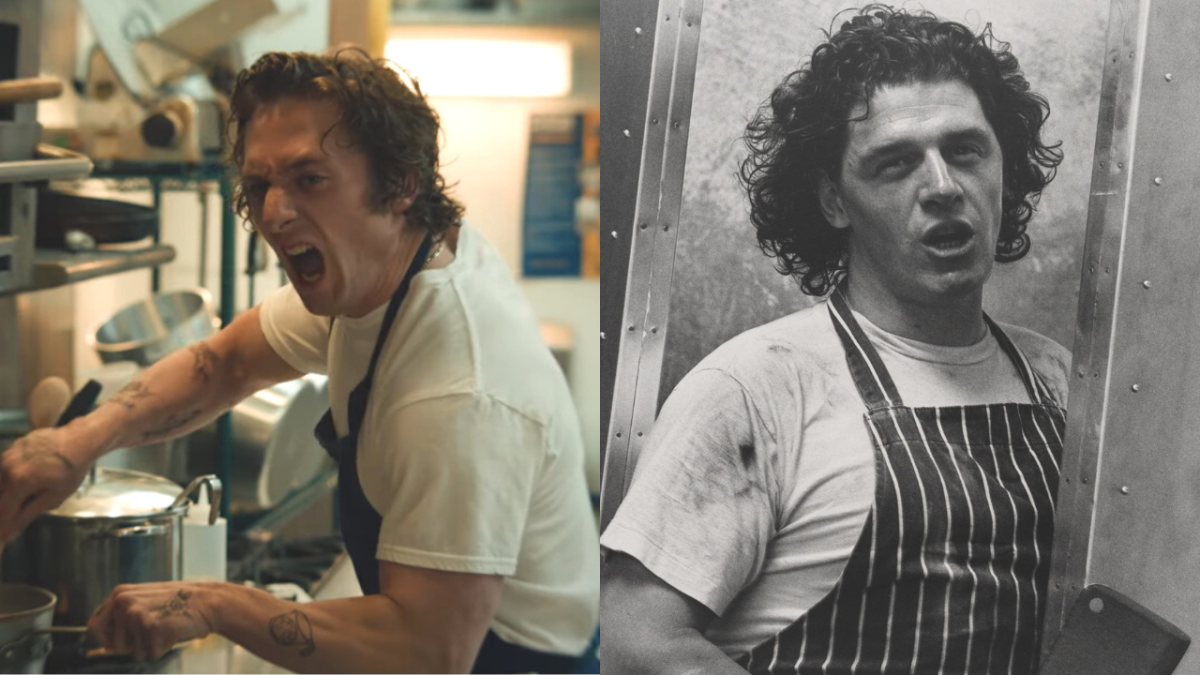
Jeremy Allen White’s portrayal as a hot chef in TV show The Bear, and the horny response online, is not a new phenomenon. Chefs are commonly portrayed in mainstream pop culture as sex icons and idolised monoliths and the general public has long lapped up this image.
But women and marginalised hospitality workers in Australia say the ubiquitous adoration of the male figurehead is detrimental, and these sexualised depictions of the industry can seriously affect how staff are treated.
Brisbane-based sommelier and wine trainer Ella Stening told PEDESTRIAN.TV although millions of Australians worked in hospitality — it’s one of the highest employing industries in the world — representations of it in media were way off.
“You either have this realistic, hellish depiction of hospitality like The Bear or these celebrity chef caricatures of themselves which aren’t reflective of or are too far removed from actual hospitality work,” they said.
“Hospitality’s fucked or hospitality’s fucking sexy, there’s no in-between.”
Anthony Bourdain, Marco Pierre White and even Masterchef’s Jock Zonfrillo either self-built or were prescribed a bad-boy image.
Gordon Ramsay’s Hell’s Kitchen glorified and celebrated a chef who verbally abused young, inexperienced chefs.
Meanwhile, front-of-house workers are often portrayed in film and TV as female, giggly, pretty, young, having fallen on hard times or still getting their lives together. Think Rachel in Friends, Two Broke Girls, or even Sam in A Cinderella Story, who’s taunted for being a “diner girl”.
Canberra-based restaurant manager and founder of a women-led wine collective Caitlin Baker said there was a gap between the way the general public revered head chefs and the lack of respect given to front-of-house staff.
“I’ve been managing restaurants for six years and I still get asked at least twice a month what I’m studying at uni,” Baker told PEDESTRIANTV.
“[People think all we do is] set some cutlery, clear some plates, we’re there to smile and look pretty and work to customers’ every beck and call.”
Baker said one of her bosses told her she needed to “dress in a way where all the customers would want to fuck you” and only hire staff that she would want to fuck.
“I was made to flirt and take shots with customers and that made [lose] self-respect.”
Stening said they thought working with food and wine was inherently sexy, but being a conduit of pleasure isn’t an excuse for objectification — which they said happens every day to front-of-house staff.
“I’m a hedonist, I’m very indulgent and I love the intensity of things that come out of that but I think that leads to some really dicey situations [at work],” they said.
“Because everything’s so unregulated and there’s no standard of behaviour that’s set in most venues, people exploit that a lot.”
James Corden‘s behaviour is a pertinent example.
A national report released in September found about 70 per cent of hospitality workers have experienced verbal or psychological abuse at work, including sexual harassment and racial abuse.
Customers were the main perpetrators but 42 per cent of respondents also said their managers or supervisors had abused them.
Abusive behaviour is often justified in film and TV because the head chef is viewed as a brooding creative genius in the pursuit of excellence. Baker said this can normalise toxic behaviour.
“It OKs it to the general public,” she said.
“If these are the normal conversations and this is how hospo people are spoken about, what is to stop people from continuing that to women in the industry?”
Sydney-based sommelier and vice president of Sommeliers Australia Bridget Raffal said while the media has some obligation to challenge norms, pop culture often holds up a mirror to society. She said the objectification of front-of-house staff comes from a misogynistic society and a misconception that the server’s role is to make the customer happy, so the first steps to combat this and make workplaces safer needed to come from within.
“Customers come in and act in an entitled way because the media and pop culture representation [say it’s ok] …but men would be doing it anyway,” she told PEDESTRIAN.TV.
“If you’re an employer, think about how you can support your staff, set firm boundaries in place.
“Every transaction should be based on mutual respect.”
And as for patrons, Raffal says everyone needs to consume entertainment more critically.
“Why do you want to watch young people being abused?”
“Everybody should reflect on that. You can’t just consume mindlessly.”



